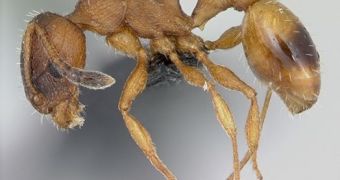Most ant species are renowned for their amazing altruistic behavior, which puts that of many humans to shame. The insects are capable of self-sacrifice of the highest order for the good of the colony, and this has been further demonstrated in a recent study. Investigators have shown that members of the species Temnothorax unifasciatus die alone, when they contract a disease. The individuals affected leave the colony when they feel the end is near, and die off far away, so as to protect the others from any disease they might be carrying, the BBC News reports.
This is the first time such a selfless behavior has been identified in any type of social insect, researchers write in the latest issue of the respected scientific journal Current Biology. German researchers, led by University of Regensburg Professor of Biology Dr. Jurgen Heinze, and PhD student Bartosz Walter, became interested in such studies after hearing anecdotal stories that individuals of many species left their families when they felt their time to die had come.
Such behavior has also been reported in dogs, elephants, cats, and sometimes even in humans. However, given the occasional nature of the phenomenon, it cannot be properly studied in the controlled settings of a scientific experiment. So, the scientists turned to this ant species. They reared an entire colony in the laboratory, and then exposed the insects to the effects of the lethal parasitic fungus called Metarhizium anisopliae. After the exposure, the researchers kept track of the workers and their habits. Most of the ants that died off left the colony days or hours before they expired, and died far away from the nest, in a foraging area.
“Our study suggests that infected ants at least in some species walk away from a colony and die alone, rather than risk infecting others,” Heinze shared with the British news agency. In order to control the fact that the fungus might be manipulating the ants, the researchers also exposed the colony to some carbon dioxide, which is known to shorten the life span of ants. Members that survived the fungus, but were still aware that they would die off, also left the colony.
“This simple experiment demonstrates that nest leaving is not caused by parasite manipulation but by the imminence of death. Another interesting finding was that the workers left the nest voluntarily and were not carried away by other workers,” University of Lausanne biologist Michel Chapuisat writes in another paper, in the same journal issue. The researcher is also involved with studying evolution of insect societies.

 14 DAY TRIAL //
14 DAY TRIAL //